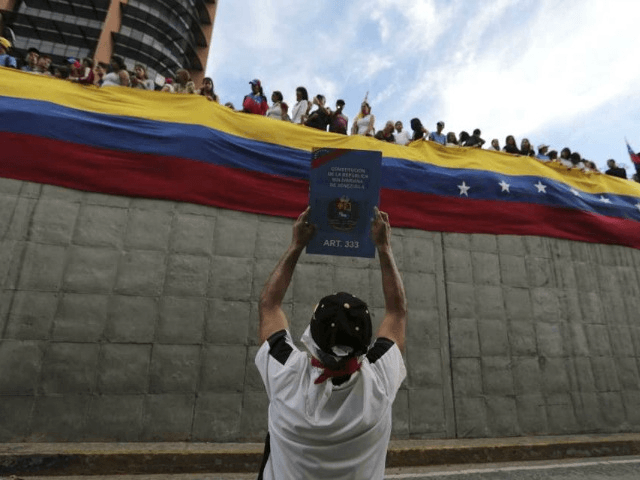The socialist government of Venezuela has banned “public assemblies and protests,” threatening up to ten years in prison for anyone participating in them, following nearly five months of daily protests against the government.
The move also precedes a highly unpopular election to choose the representatives for the National Constituents’ Assembly, a parallel legislature that will be tasked with drafting a new constitution to cement dictator Nicolás Maduro’s power.
“Public assemblies, protests, concentrations of people and any other similar act that could perturb or affect the normal development of the electoral process are forbidden throughout the nation,” Minister of the Interior Néstor Reverol announced Thursday evening. He noted that anyone organizing or participating in assemblies could face between five and ten years in prison, but did not specify whether this ban would continue following the election scheduled for Monday.
He added that the government has tasked the National Armed Forces (FANB) authority over all local and state police departments. The FANB and the Bolivarian National Guard (GNB), the wing of the armed forces tasked with handling domestic incidents, have perpetrated a variety of gross human rights violations against Venezuelans since Maduro took power. Luis Almagro, the head of the Organization of American States (OAS), is reportedly planning a potential case against Maduro at the International Criminal Court (ICC) for crimes against humanity.
Prior to the general ban on public assembly, a Miami Herald report unveiled that Maduro had attempted to convince the opposition to “cool down” protests in exchange for postponing the vote on Sunday through Spanish socialist José Luis Rodríguez Zapatero, who has previously acted as a mediator for the regime. The opposition refused to do this as well as stop supporting sanctions by the United States on the government, another Maduro demand.
On Tuesday and Wednesday, the Democratic Unity Roundtable (MUD), a coalition of opposition parties, organized a 48-hour general strike in the city of Caracas, leaving the streets empty, stores closed, and pausing daily life in the capital. On Friday, the MUD announced that they would hold the Taking of Caracas, a giant protest in the capital with analogs throughout the country intended to show the number of people against Maduro. The opposition has promised not to allow Reverol’s announcement to prevent them from protesting. MUD leader Freddy Guevara announced on Twitter that the protests would begin at noon local time:
No es solo tranca, debemos TOMAR calles y principales vías con gente. Ayer y hoy calles vacías,mañana tomarlas en toda Vzla. A partir de 12m
— Freddy Guevara (@FreddyGuevaraC) July 28, 2017
“Tomorrow, every Venezuelan should prepare for the intense agenda coming [the government’s] way,” Guevara said Thursday.
Anticipating violence, the Venezuelan Episcopal Conference has released a statement urging the government to cease using violence against those who oppose socialism and reiterating its opposition to Sunday’s vote. “We want to remind the FANB … that their first obligation is to the people and it is called upon by the constitution to defend the lives of all those citizens, without distinguishing in any way, especially political partisanship,” the note read.
With private discussions reportedly failing, Venezuelan state media claimed Friday that Maduro has made a public plea for dialogue with the opposition. “I propose to the Venezuelan political opposition that they abandon the path of insurrection, return to the constitution, and shortly before the election … open a table of dialogue, national agreement, and reconciliation,” Maduro reportedly said. He did not elaborate on why he wished the opposition to adhere to a constitution he has decreed should no longer be in vigor and did not mention the failure of the year-long “dialogue” throughout 2016, which allowed Maduro to amass the power necessary for this week’s vote.
The international community has almost universally rejected Sunday’s vote. In addition to the OAS, the United Nations’ Human Rights Committee has suggested Venezuelans should not participate in the election. Following Maduro’s refusal to cancel the vote, the United States issued a new round of sanctions against the socialist regime Wednesday.

COMMENTS
Please let us know if you're having issues with commenting.